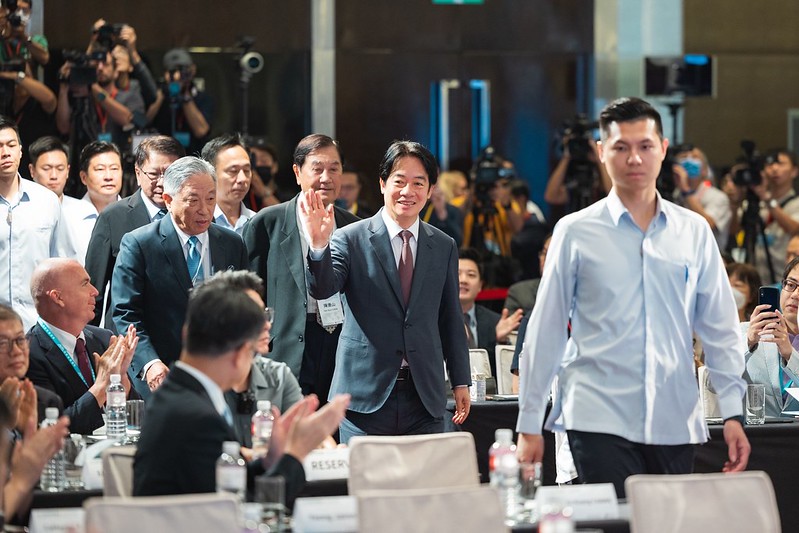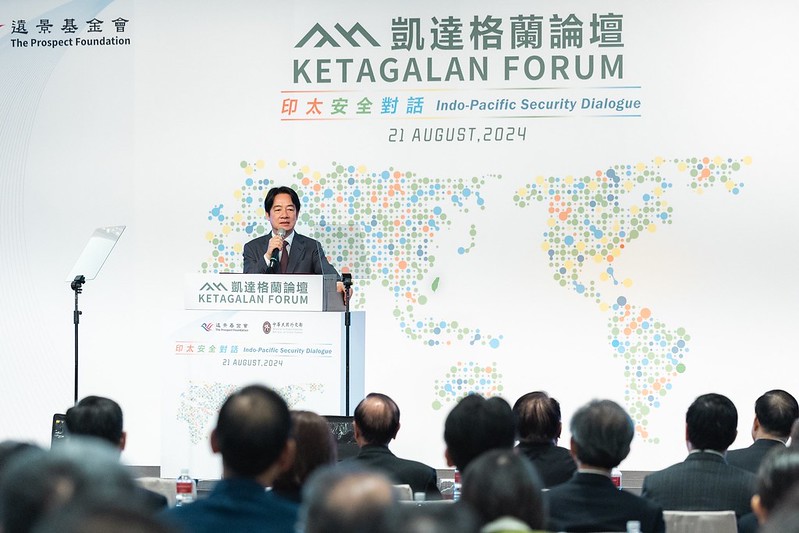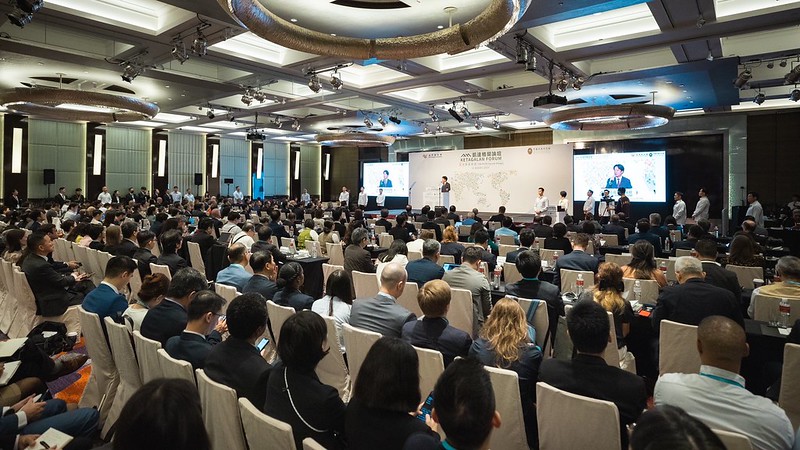News & activities
 News releases
News releases
On the morning of August 21, President Lai Ching-te attended the opening of the Ketagalan Forum: 2024 Indo-Pacific Security Dialogue. In remarks, President Lai stated that in recent years, authoritarianism has grown and is becoming more aggressive, and is now a challenge at the global level. The president indicated that Taiwan, located in the first island chain, will implement the Four Pillars of Peace action plan for maintaining peace and stability in the Taiwan Strait, which includes strengthened national defense, improved economic security, strengthened partnerships with democratic countries, and stable and principled cross-strait leadership.
President Lai emphasized that Taiwan is determined to serve as a key driver for the development of global democracy, peace, and prosperity. More than anything, the president stated, we hope our partners can be united as we support the democratic umbrella and defend our shared values.
A transcript of President Lai’s remarks follows:
The Ketagalan Forum, now in its eighth year, is a platform for dialogue on security in the Indo-Pacific. This year’s forum will cover topics such as security in the Taiwan Strait, economic security and economic coercion, and the practice and challenges of digital democracy. These are issues of concern for democratic countries around the world. And Taiwan is more than willing to work even closer with other countries in search of solutions.
I want to extend a warm welcome to you all, and sincerely thank you for making the trip to Taiwan. Joining us today are political leaders, parliamentarians, and experts from 11 countries. We also have the special honor of welcoming former Prime Ministers Noda Yoshihiko [of Japan] and Eduard Heger [of the Slovak Republic], and [former United States] Ambassador [to the United Nations] Nikki Haley, who will be keynote speakers.
Your presence demonstrates concrete support for democratic Taiwan. It’s also a symbol of solidarity for the Indo-Pacific region.
In recent years, authoritarianism has grown and is becoming more aggressive. It’s now a challenge at the global level.
We have seen Russia invade Ukraine, and North Korea threaten the peace and stability of Northeast Asia. Now conflicts have also broken out in the Middle East.
We have also seen China’s military expansionism in the East and South China Seas, not only through military exercises in the Taiwan Strait, but also in joint sea and air drills with Russia in the South China Sea, Western Pacific, and Sea of Japan. Such actions are intended to intimidate China’s neighbors and undermine regional peace and stability.
China has even weaponized trade. Using various pressures and threats, it’s politically manipulating not just Taiwan, but also Japan, Korea, Australia, Lithuania, Canada, and other countries. I am sure that these unilateral tactics of economic coercion are very familiar to our guests from Australia and Lithuania.
We have also seen China use hybrid warfare tactics, such as cyberattacks, cognitive warfare, disinformation, and political interference, in attempts to infiltrate and influence elections in Taiwan and other countries. China has also tried using technologies and the internet to spread digital authoritarianism and thus influence the development of democracy globally.
We are all fully aware that China’s growing authoritarianism will not stop with Taiwan; nor is Taiwan the only target of China’s economic pressures. China intends to change the rules-based international order. That is why democratic countries must come together and take concrete action. Only by working together can we inhibit the expansion of authoritarianism.
Located in the first island chain, Taiwan faces the immediate threat of China. But Taiwan will not be intimidated. We will take responsibility to maintain peace and stability in the Taiwan Strait by implementing the Four Pillars of Peace action plan.
First, we will strengthen our national defense.
We will continue to reform national defense and increase our defense budget. As we make ourselves more self-sufficient in national defense and facilitate military procurement, we will outfit our forces with the equipment and weaponry they need. At the same time, we will create a mechanism for introducing emerging technologies and build up our civil defense resilience, strengthening our capabilities and showing our resolve for self-defense.
Second, we will build economic security.
China continues to suppress Taiwan’s presence in the international community, impeding us from signing trade agreements with other countries and participating in the regional economy. However, our resolve to engage with the world remains strong.
Over the past several years, we have continued to expand the global presence of our economy and diversify risks. We have also greatly reduced dependence on China.
From 2010 to last year, Taiwanese investment in China fell from 83.8 percent to 11.4 percent of total outbound investment, marking an all-time low. In the first half of 2010, our exports to China accounted for 43.1 percent of total exports. But in the first half of this year, that figure was only 31.2 percent, the lowest for the same period in the last 22 years.
We also hope to diversify trade through new trade agreements to further increase the resilience of our economy in the face of economic coercion.
At present, the first agreement under the Taiwan-US Initiative on 21st-Century Trade has already been signed, and the second-round negotiation is ongoing. We have also signed a Foreign Investment Promotion and Protection Arrangement with Canada to expand our presence in the North American market.
As for the other side of the Atlantic, we have signed an enhanced trade partnership arrangement with the United Kingdom, marking Taiwan’s very first base framework for further economic and trade relations with a European country.
We have also achieved significant results with our New Southbound Policy. In the first half of this year, Taiwan’s exports to the 18 New Southbound countries reached US$50.2 billion, the highest amount ever for this timeframe.
Moving forward, Taiwan will continue seeking admission to the Comprehensive and Progressive Agreement for Trans-Pacific Partnership (CPTPP). Alongside other countries in the region, we hope to create even more economic success and enhance our economic resilience.
Third, we will strengthen our partnerships with democratic countries.
Taiwan will continue to expand collaboration with our democratic partners in all areas through values-based diplomacy. This year’s forum will feature discussion on the role of Taiwan’s semiconductors in stabilizing global supply chains. In this regard, we will continue to cooperate with like-minded partners on “democracy chips” as we build sustainable supply chains to advance global prosperity and development.
Taiwan will also step up exchanges and cooperation with other countries in national defense and security. Alongside fellow democracies, we will demonstrate the strength of deterrence, prevent war, and achieve our goal of peace through strength.
The final pillar is stable and principled cross-strait leadership.
As a responsible member of the international community, Taiwan will neither yield nor provoke, and maintain the status quo in the Taiwan Strait. On the condition of parity and dignity, we are willing to conduct exchanges and cooperate with China to achieve peace and stability in the Taiwan Strait.
Taiwan is determined to serve as a key driver for the development of global democracy, peace, and prosperity. More than anything, we hope our partners can be united as we support the democratic umbrella. We must take collective action to confront the challenges presented by authoritarianism and defend our shared values.
To close, I would like to express my appreciation once again for your consideration and support for Taiwan. Let’s continue to press ahead side by side. Thank you very much.
Also in attendance at the event were former Prime Minister Noda, former Prime Minister Heger, and Ambassador Haley. Convenor of the Centre for Research on Strategic and Security Issues Pankaj Saran, Chairman of the Northern Europe Policy Centre Artis Pabriks, Member of the Estonian Riigikogu (parliament) Kalle Laanet, and former European Union Ambassador to the Philippines Franz Jessen were among the 12 high-ranking officials, parliamentarians, scholars, and experts from 11 countries who participated in this year’s dialogues with officials, scholars, and experts from Taiwan.





